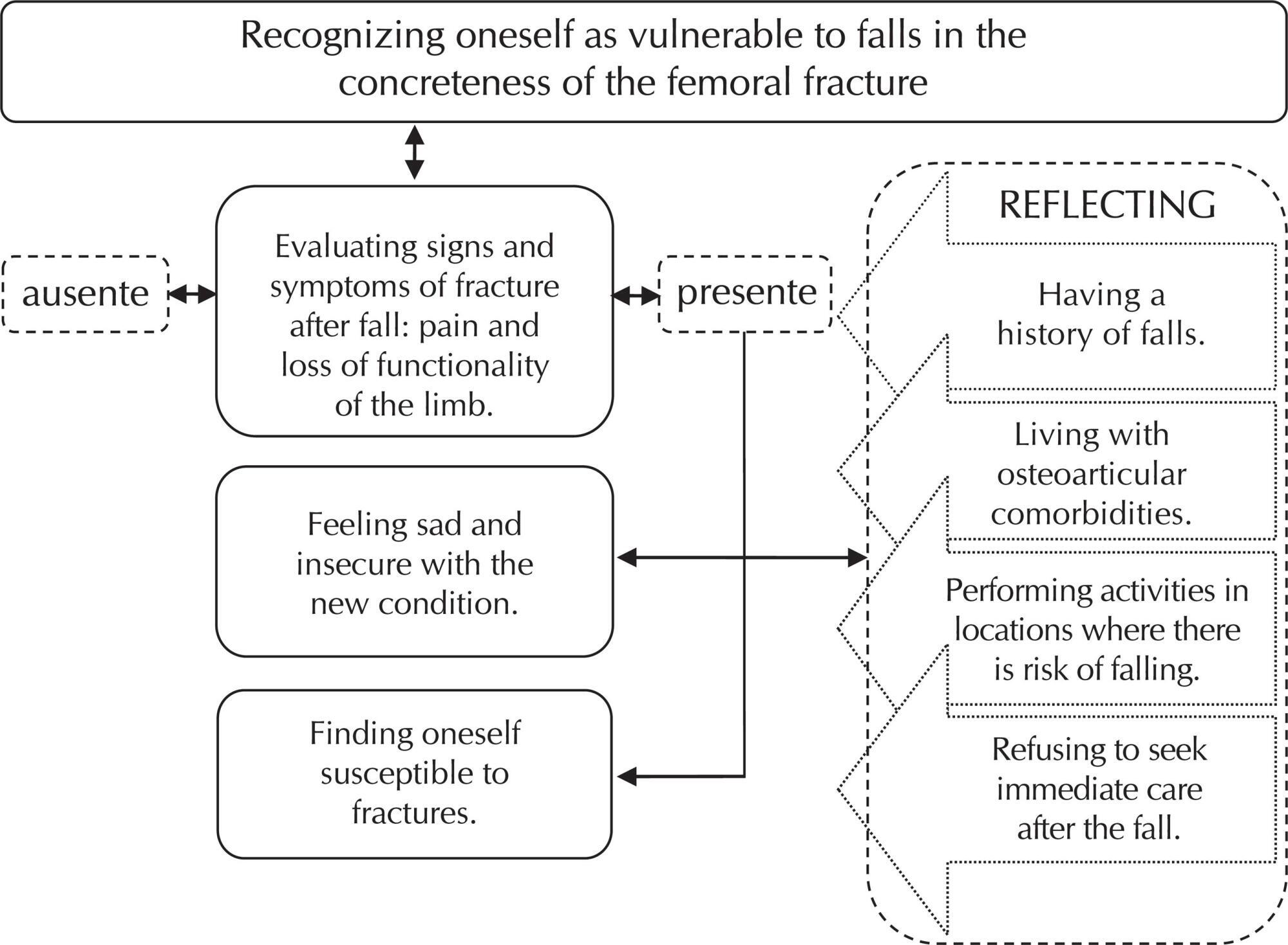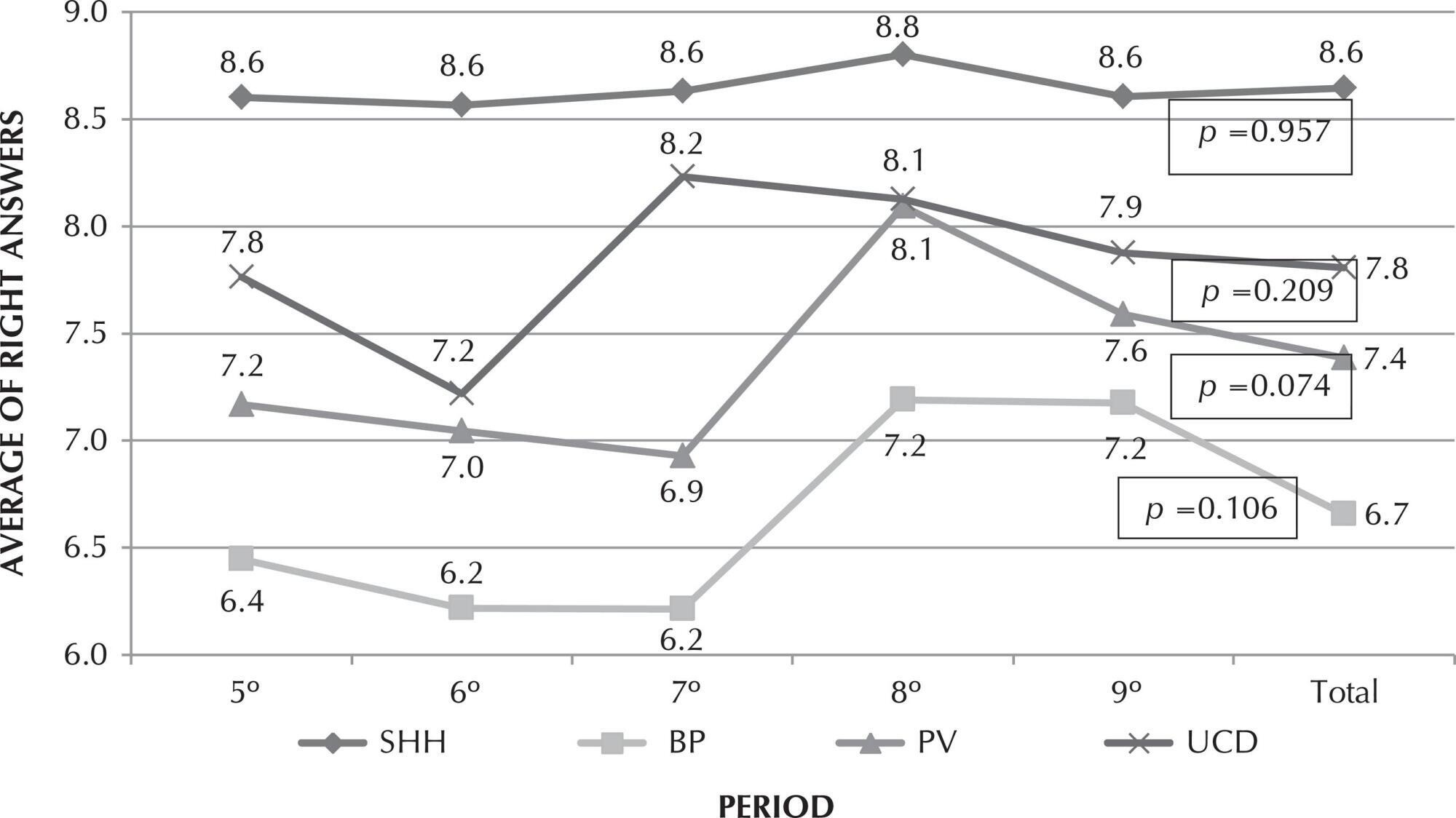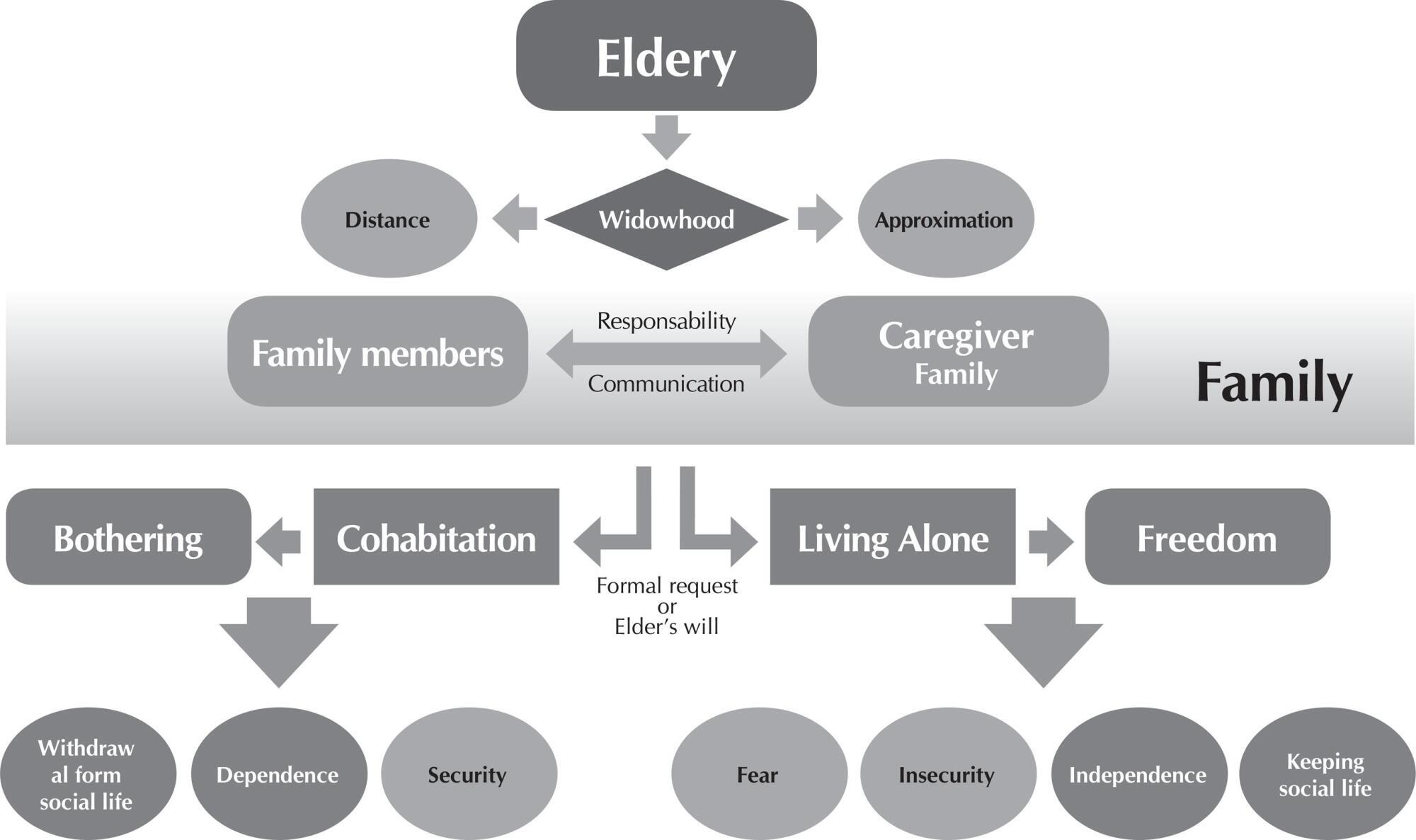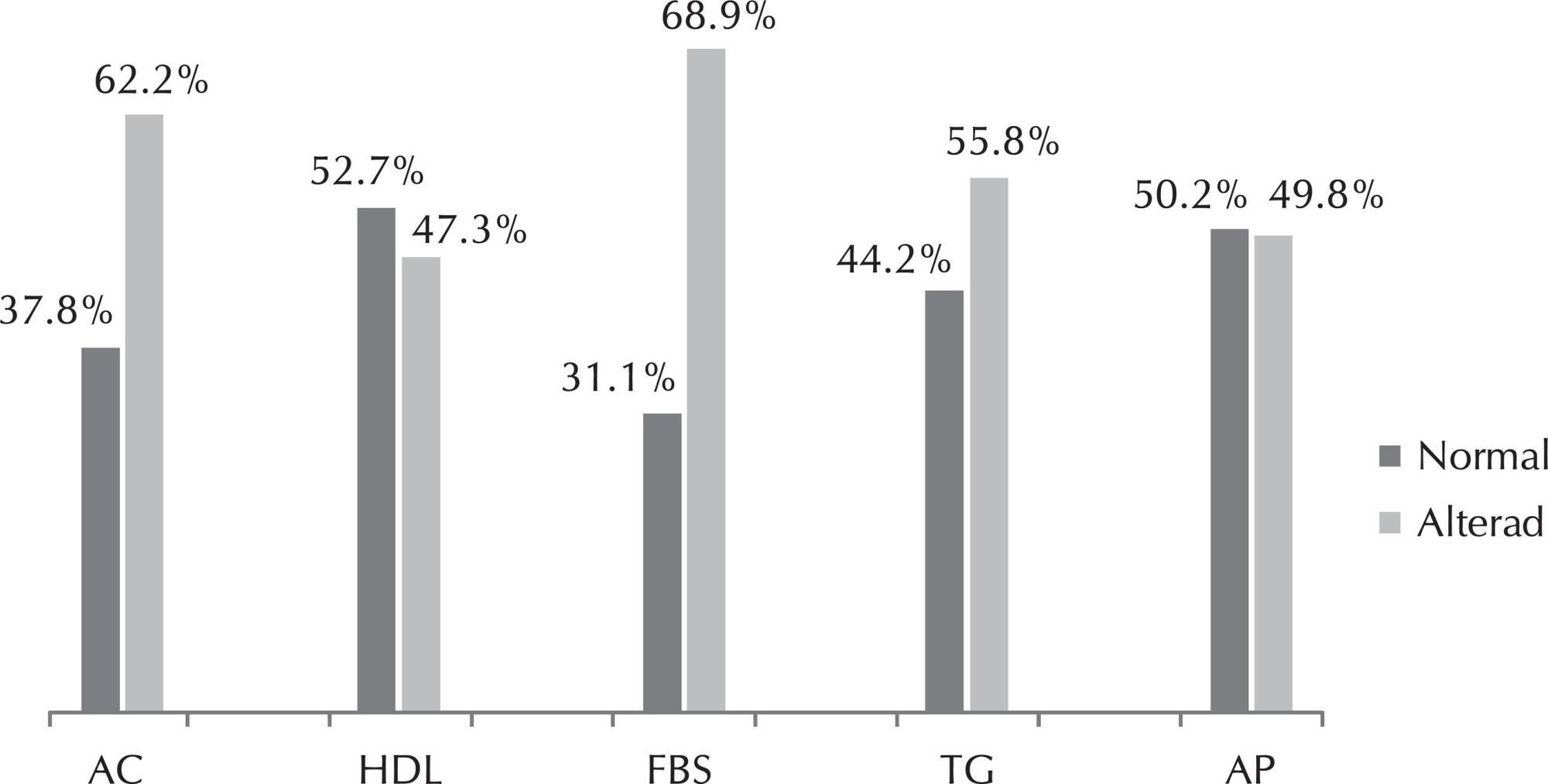-
RESEARCH01-01-2017
Impact of home visits on the functional capacity of patients with venous ulcers
Revista Brasileira de Enfermagem. 2017;70(2):287-293
Abstract
RESEARCHImpact of home visits on the functional capacity of patients with venous ulcers
Revista Brasileira de Enfermagem. 2017;70(2):287-293
DOI 10.1590/0034-7167-2016-0291
Views0See moreABSTRACT
Objective:
to compare the impact of home visits, before and after instructions, on the functional capacity of adult and elderly patients with venous ulcers, by means of the KATZ-EIAVD Scale.
Method:
experimental, clinical, randomized, non-blind and controlled study, developed with 32 patients (case and control groups). The research settings were the Wound Care Clinic of the University Hospital Antonio Pedro, and the homes of patients assisted in this clinic. Data collection took place from February to June 2014, by means of a health unit evaluation tool, the KATZ-EIAVD Scale, and a script of instructions to be given to the research subjects that had received a home visit.
Results:
the studied population present excellent independence for activities of daily living, with no significant variation among them.
Conclusion:
the studied groups have functional capacity with similar progress.
-
RESEARCH01-01-2017
The elderly recognizing themselves as vulnerable to falls in the concreteness of the femoral fracture
Revista Brasileira de Enfermagem. 2017;70(2):279-286
Abstract
RESEARCHThe elderly recognizing themselves as vulnerable to falls in the concreteness of the femoral fracture
Revista Brasileira de Enfermagem. 2017;70(2):279-286
DOI 10.1590/0034-7167-2016-0392
Views0See moreABSTRACT
Objectives:
understand the experience of the elderly with falls followed by femoral fracture and elaborate theoretical model of this process of lived experience.
Method:
qualitative research with theoretical saturation through analysis of the ninth nondirected interview of elderly who underwent such experience. Interviews were recorded, transcribed, and analyzed according to Grounded Theory.
Results:
three categories emerged (sub-processes): evaluating signs and symptoms of fracture after the fall; feeling sad and insecure with the new condition; and finding oneself susceptible to fractures. From realignment of these categories (sub-processes) we could abstract the central category (process), recognizing oneself as vulnerable to falls in the concreteness of the fracture.
Conclusion:
the theoretical model considering the Symbolic Interactionism signals the implementation of continued program for fall prevention, with teaching strategies that encourage the elderly to reflect on the concreteness of contexts in which there is risk of occurring injury to their health.

-
RESEARCH01-01-2017
Self-esteem and health-related quality of life in ostomized patients
Revista Brasileira de Enfermagem. 2017;70(2):271-278
Abstract
RESEARCHSelf-esteem and health-related quality of life in ostomized patients
Revista Brasileira de Enfermagem. 2017;70(2):271-278
DOI 10.1590/0034-7167-2016-0161
Views0See moreABSTRACT
Objective:
to assess self-esteem (SE) and health-related quality of life (HRQoL) in ostomized patients due to colorectal cancer.
Method:
cross sectional research with a quantitative approach. Three instruments were used for data collection: one instrument containing sociodemographic and clinical data, Rosenberg’s Self-Esteem Scale, and the European Organization for Research and Treatment of Cancer Quality of Life Questionnaire.
Results:
SE and HRQoL were considered satisfactory. Significant statistical difference was found in the social function domain and marital status, ostomy duration, location, and time; global health scale and ostomy type; cognitive function and pain in the ostomy site. There was a correlation between self-esteem and all the functional scales and the global health scale.
Conclusion:
knowing SE and HRQoL levels, in addition to the variables that influence them, supports ostomized patients’ care planning, rehabilitation, and social autonomy.
-
RESEARCH01-01-2017
Quality of life of patients who undergone myocardial revascularization surgery
Revista Brasileira de Enfermagem. 2017;70(2):257-264
Abstract
RESEARCHQuality of life of patients who undergone myocardial revascularization surgery
Revista Brasileira de Enfermagem. 2017;70(2):257-264
DOI 10.1590/0034-7167-2016-0201
Views0See moreABSTRACT
Objective:
to evaluate the quality of life of patients who underwent revascularization surgery.
Method:
a descriptive, cross sectional study, with quantitative approach carried out with 75 patients. The questionnaire WHOQOL-Bref was used to evaluate the quality of life (QOL).
Results:
patients’ QOL evaluation presented a moderate result, with need of improvement of all domains. Low income patients had the worst evaluation of QOL in the domain environment (p=0,021), and the ones from Recife/metropolitan area, in the domain social relationship (p=0,021). Smoker (p=0,047), diabetic (p=0,002) and alcohol consumption (p=0,035) patients presented the worst evaluation of the physical domain. Renal patients presented the worst evaluation of QOL in the physical (P=0,037), psychological (p=0,008), social relationship (p=0,006) domains and total score (p=0,009).
Conclusion:
the improvement of QOL depends on the individual’s process of behavioral change and the participation of health professionals is essential to formulate strategies to approach these patients, especially concerning health education.
-
RESEARCH01-01-2017
Semiotics and semiology of Nursing: evaluation of undergraduate students’ knowledge on procedures
Revista Brasileira de Enfermagem. 2017;70(2):249-256
Abstract
RESEARCHSemiotics and semiology of Nursing: evaluation of undergraduate students’ knowledge on procedures
Revista Brasileira de Enfermagem. 2017;70(2):249-256
DOI 10.1590/0034-7167-2016-0417
Views0ABSTRACT
Objective:
to assess the knowledge of scholars on Nursing regarding simple hands hygiene (SHH), blood pressure measurement (BP), peripheral venipuncture (PV) with venous catheter and male urethral catheterization delay (UCD) procedures.
Method:
quantitative study carried out between February and May 2014, with 186 undergraduate Nursing students from 5th to 9th period of a public university of Rio Grande do Norte, with application of four questionnaires. One carried out descriptive and analytic analysis.
Results:
the students presented low average percentage of right answers, especially in blood pressure measurement (55.5%); SHH’s average was higher than 70%. The average of correct answers was the highest in SHH (8.6), followed by UCD (7.8), PV (7.4) and BP (6.7). The questions regarding the topic “concepts” showed less correct answers when comparing it to the topic “technique steps”.
Conclusion:
it is necessary to establish knowledge monitoring strategies, in order to stimulate the constant improvement.
Keywords:Education in NursingKnowledgeNursing CareResearch in Nursing EvaluationUndergraduate Nursing StudentsSee more
-
RESEARCH01-01-2017
Multi-professional team’s perception of nurses’ competences in liver transplantations
Revista Brasileira de Enfermagem. 2017;70(2):242-248
Abstract
RESEARCHMulti-professional team’s perception of nurses’ competences in liver transplantations
Revista Brasileira de Enfermagem. 2017;70(2):242-248
DOI 10.1590/0034-7167-2016-0223
Views0See moreABSTRACT
Objective
describe the multi-professional team’s perception of nurses’ competences in liver transplantation programs.
Method:
descriptive study with a qualitative approach. Data were collected through a questionnaire. Participants were 12 professionals of the liver transplantation team of a reference hospital. For result interpretation, the thematic analysis technique was employed.
Results:
the professionals assessed the competences employed by nurses as proactive, autonomous, creative, humanized, capable of teamwork, decision-making and conflict management.
Conclusion:
this study made it possible to demonstrate that members of the multi-professional team perceived nurses as professionals capable of coordinating and integrating the skills “knowing, doing, being and co-existing”, enabling quality care for candidates and receivers of liver transplants, as well as for their families and/or caregivers in all perioperative phases.
-
RESEARCH01-01-2017
The family in face of the elderly’s reality of living alone
Revista Brasileira de Enfermagem. 2017;70(2):235-241
Abstract
RESEARCHThe family in face of the elderly’s reality of living alone
Revista Brasileira de Enfermagem. 2017;70(2):235-241
DOI 10.1590/0034-7167-2016-0398
Views0See moreABSTRACT
Objective:
to understand the family dynamics in face of the reality of the elderly living alone.
Method:
study of qualitative approach with theoretical reference of symbolic interactionism that involved interviews with families. Data were analyzed by thematic analysis.
Results:
six families participated in the study. The discourse analysis originated the following categories: The family respecting their decision making; The family organizing itself to the process of living alone after the age of 80 years; The family experiencing the freedom of living alone.
Conclusion:
in this study, it was possible to identify the facilitation of the possibility of living alone with preparation and agreements between the family during the family life cycle, leading to the feeling of freedom and quality of life of all members. Nursing, as a science responsible for elaborating care strategies, should work together with families to assist in the planning of care plans based on the individual social reality of the family.

-
ERRATUM01-01-2016
ERRATUM
Revista Brasileira de Enfermagem. 2016;69(5):1002-1002
Abstract
ERRATUMERRATUM
Revista Brasileira de Enfermagem. 2016;69(5):1002-1002
DOI 10.1590/0034-7167.20166905e01
Views0Article “Alcohol and alcoholism: attitudes of nursing students”, with number of DOI: http://dx.doi.org/10.1590/S0034-71672013000100013, published in the journal Revista Brasileira de Enfermagem, v66(1):84-9, page 89 that read:“18. Miranda SP, Vargas D. Satisfação de pacientes de um centro de atenção Psicossocial álcool e drogas com o atendimento do enfermeiro. SMAD, Rev Eletrônica Saúde Mental Alcool Drog 2019;5(2):1-15”.[…]See more -
REVIEW01-01-2016
Research methodology for nursing and health: a book review
Revista Brasileira de Enfermagem. 2016;69(5):1000-1001
Abstract
REVIEWResearch methodology for nursing and health: a book review
Revista Brasileira de Enfermagem. 2016;69(5):1000-1001
DOI 10.1590/0034-7167-2015-0135
Views0For those interested in nursing and health, the book entitled “Research methodology for nursing and health: from theory to practice”() was released in October 2015, at the 67th Brazilian Congress of Nursing, sponsored by National ABEn. The interest emerged from two organizers: Dr. Maria Ribeiro Lacerda (UFPR) and Dr. Regina Gema Santini Costerano (UNIFRA). Forty-seven […]See more -
REFLECTION01-01-2016
Violence in the workplace in Nursing: consequences overview
Revista Brasileira de Enfermagem. 2016;69(5):996-999
Abstract
REFLECTIONViolence in the workplace in Nursing: consequences overview
Revista Brasileira de Enfermagem. 2016;69(5):996-999
DOI 10.1590/0034-7167-2015-0133
Views0See moreABSTRACT
Objective:
to reflect on the consequences of workplace violence experienced by nursing professionals.
Methods:
this is a reflection paper based on recent publications related to the subject, particularly researches carried out in Brazil and in other countries.
Results:
exposure to workplace violence has been associated with health problems in nursing professionals, which may be physical damage, emotional manifestations, and psychic disorders. It also affects the employee performance, his or her family and social interactions.
Conclusion:
this phenomenon is potentially noxious and costly, for it leads to suffering, illness, absence from work, and even death. This reflection calls attention moreover to the importance of a safe and adequate health care work environment.
-
REFLECTION01-01-2016
Construcción de la enfermera de práctica avanzada en Catalunya (España)
Revista Brasileira de Enfermagem. 2016;69(5):991-995
Abstract
REFLECTIONConstrucción de la enfermera de práctica avanzada en Catalunya (España)
Revista Brasileira de Enfermagem. 2016;69(5):991-995
DOI 10.1590/0034-7167.2016690507
Views0RESUMEN
El desarrollo de la enfermera de práctica avanzada (EPA) ha supuesto un reto para las enfermeras en países como EE.UU., Canadá, Gran Bretaña y Australia, entre otros, y desde hace escasos años está siendo considerada en Catalunya y España como un sistema para desarrollar nuevos roles que aporten eficacia y eficiencia al sistema sanitario. El presente artículo pretende conceptualizar la EPA y los modelos de referencia así como contextualizar y reflexionar sobre la EPA en Catalunya, desde el punto de vista de formación y de la implantación de los denominados nuevos roles de enfermería, asimilándolos a la práctica avanzada.
Keywords:Competencia ClínicaEnfermeríaEnfermería de Práctica AvanzadaPráctica ProfesionalRol de la EnfermeraSee more -
REFLECTION01-01-2016
Developing the Advanced Practice Nurse in Catalonia
Revista Brasileira de Enfermagem. 2016;69(5):991-995
Abstract
REFLECTIONDeveloping the Advanced Practice Nurse in Catalonia
Revista Brasileira de Enfermagem. 2016;69(5):991-995
DOI 10.1590/0034-7167.2016690507
Views0See moreABSTRACT
The development of advanced practice nurses (APN) has proved a challenge for nurses in countries such as the USA, Canada, Great Britain, and Australia among others. It is only in recent years that the system has been considered in Catalonia and Spain as a way to develop new roles to bring effectiveness and efficiency to the health system. From the standpoint of training and implementation of the above-mentioned new nursing roles, the following article aims to conceptualise APN and its reference models, as well as to contextualise and reflect on APN in Catalonia in order to assimilate them into advanced practice.
-
EXPERIENCE REPORT01-01-2016
International academic mobility in nursing education: an experience report
Revista Brasileira de Enfermagem. 2016;69(5):986-990
Abstract
EXPERIENCE REPORTInternational academic mobility in nursing education: an experience report
Revista Brasileira de Enfermagem. 2016;69(5):986-990
DOI 10.1590/0034-7167-2015-0128
Views0See moreABSTRACT
Objective:
report the experience of international academic mobility in Ireland through the program Science Without Borders during undergraduate education in nursing.
Method:
a report of experience presented in chronological order, with a descriptive nature.
Results:
the opportunity to know and be able to discuss questions regarding health and nursing in Ireland allowed the review of concepts and a more reflective perspective regarding nursing practices. Additionally, the exchange promoted personal strengthening regarding the confrontation and solution of problems, development of technical and scientific abilities, improvement of linguistic competences and construction of personality, independence and maturity.
Conclusion:
regarding such constructive and enriching experience that this mobility provides to students, to the governing authorities, to the population and to Brazilian nursing, sharing this experience is expected to serve as encouragement for those who search for new horizons, with the objective of adding knowledge for their personal and professional life.
-
EXPERIENCE REPORT01-01-2016
Online training for health professionals in three regions of Brazil
Revista Brasileira de Enfermagem. 2016;69(5):981-985
Abstract
EXPERIENCE REPORTOnline training for health professionals in three regions of Brazil
Revista Brasileira de Enfermagem. 2016;69(5):981-985
DOI 10.1590/0034-7167.2016690506
Views0See moreABSTRACT
Objective:
to describe online training experience aimed at professionals working in the public health service in 27 Neonatal and Pediatric Intensive Care Units, and to reflect concerning the training process and possible improvements in this process.
Method:
this is an experience report study about the online training with multidisciplinary content, planned from the situational diagnosis of 27 institutions. The training target set was 10 participants per institution and per module, including the following topics: Indicators of Quality as a Management Tool, Hand Hygiene, Patient Safety, Intravenous Therapy and Patients’ Chart Record.
Results:
a total of 2,071 active students in the modules, with 1,046 approved. The mean of 76 students per module exceeded the target set.
Conclusion:
experience has shown that online training is comprehensive as a potential tool for the professional technical development and digital inclusion. The online learning system becomes weakened if participants are unaware of the technological resources.
-
REVIEW01-01-2016
Technologies in intensive care: causes of adverse events and implications to nursing
Revista Brasileira de Enfermagem. 2016;69(5):972-980
Abstract
REVIEWTechnologies in intensive care: causes of adverse events and implications to nursing
Revista Brasileira de Enfermagem. 2016;69(5):972-980
DOI 10.1590/0034-7167.2016690505
Views0See moreABSTRACT
Objective:
to identify the causes of adverse events affecting clients resulting from the use of equipment in intensive care services; to point out the main recommendations for clinical practice to minimize these events and, then, discuss the implications to nursing care.
Method:
integrative and descriptive review on the SciELO, Medline, LILACS, and PubMed databases. Articles were selected based on the inclusion criteria and the structured instrument was applied.
Results:
altogether, 11 articles were selected where three evidence units were outstanding: Equipment failure; inadequate use of equipment; and team failure. Permanent education of professionals; evaluation of production and availability of equipment; and use of checklists are recommended.
Conclusion:
preventing adverse events related to equipment is one of the nursing responsibilities and requires the establishment of defensive barriers to prevent these.
-
ERRATUM01-13-2024
ERRATUM
Revista Brasileira de Enfermagem. 2024;77(6):e2024n6e08
Abstract
ERRATUMERRATUM
Revista Brasileira de Enfermagem. 2024;77(6):e2024n6e08
DOI 10.1590/0034-7167.20247706e08
Views0In the article “Brazilian nursing specific situation, middle and micro-range theories: a bibliometric study”, with DOI number: , published in Revista Brasileira de Enfermagem, 2024;77(4):e20230520, Chart 1:Where it read:[…]See more -
ERRATUM01-13-2024
ERRATA
Revista Brasileira de Enfermagem. 2024;77(6):e2024n6e07
Abstract
ERRATUMERRATA
Revista Brasileira de Enfermagem. 2024;77(6):e2024n6e07
DOI 10.1590/0034-7167.20247706e06pt
Views0No artigo “Crenças e atitudes de pais ou responsáveis legais sobre a vacinação infantil: revisão de escopo”, com número DOI: , publicado no periódico Revista Brasileira de Enfermagem, 2024;77(4):e20240126, página 5:Onde se lia:[…]See more -
ORIGINAL ARTICLE01-13-2024
Indicators associated with severity and mortality in hospitalized people with HIV: A retrospective cohort
Revista Brasileira de Enfermagem. 2024;77(6):e20240204
Abstract
ORIGINAL ARTICLEIndicators associated with severity and mortality in hospitalized people with HIV: A retrospective cohort
Revista Brasileira de Enfermagem. 2024;77(6):e20240204
DOI 10.1590/0034-7167-2024-0204
Views0See moreABSTRACT
Objectives:
to compare the sociodemographic and clinical severity indicators of hospitalized people with HIV in relation to clinical outcomes and urgent hospital admission.
Methods:
a retrospective cohort study was conducted with 102 medical records of HIV-infected individuals hospitalized in a hospital in southern Brazil. In addition to descriptive analysis, Fisher’s exact test, Pearson’s Chi-square, and logistic regression were used.
Results:
the data showed a significant direct effect on severity indicators in the following variables: male sex (p=0.013), skin color (p=0.023), level of education (p=0.000), urgent admissions (p=0.000), late diagnosis (p=0.001), diabetes mellitus (p=0.001), hypertension (p=0.004), kidney disease (p=0.002), high viral load (p=0.006), CD4+ count below 200 (p=0.005), fever (p=0.016), weight loss (p=0.013), co-infection with hepatitis C (p=0.004), and mortality (p=0.007).
Conclusions:
three sociodemographic and thirteen clinical markers were identified as being associated with the risk of clinical deterioration in hospitalized people with HIV.

-
ORIGINAL ARTICLE01-13-2024
Nurses’ perspectives on the use of telemonitoring in the management of people with diabetes and hypertension
Revista Brasileira de Enfermagem. 2024;77(6):e20230481
Abstract
ORIGINAL ARTICLENurses’ perspectives on the use of telemonitoring in the management of people with diabetes and hypertension
Revista Brasileira de Enfermagem. 2024;77(6):e20230481
DOI 10.1590/0034-7167-2023-0481
Views1See moreABSTRACT
Objectives:
to understand the perspective of nurses on the use of telemonitoring in the management of people with type 2 diabetes mellitus and arterial hypertension in primary care.
Methods:
this qualitative research involved sixteen nurses from eight municipalities in Paraná. Data were collected between November 2022 and January 2023 through inperson or remote interviews, which were audio-recorded and subjected to content analysis.
Results:
according to the nurses, telemonitoring enhances users’ knowledge about these conditions, communication and connection with the team, and productivity. However, the lack of electronic resources and equipment, high staff turnover, low user adherence, and the limited availability of professional time present significant challenges.
Final Considerations:
the effective implementation and operation of telemonitoring in the management of people with diabetes and hypertension involve both potential benefits and barriers. It is essential to have the availability of human and technological resources, managerial support, and the commitment of professionals and users.
-
ORIGINAL ARTICLE01-13-2024
Knowledge, Attitudes, and Practices of nurses regarding blood culture collection
Revista Brasileira de Enfermagem. 2024;77(6):e20230424
Abstract
ORIGINAL ARTICLEKnowledge, Attitudes, and Practices of nurses regarding blood culture collection
Revista Brasileira de Enfermagem. 2024;77(6):e20230424
DOI 10.1590/0034-7167-2023-0424
Views0ABSTRACT
Objectives:
to investigate the knowledge, attitudes, and practices of nurses regarding blood culture collection.
Methods:
a cross-sectional study was conducted in five Brazilian public hospitals with 112 nurses. Data were collected using an adapted questionnaire and analyzed through descriptive and inferential statistics.
Results:
nurses who did not consider themselves capable of collecting blood cultures had a 72% lower chance of performing the collection at the recommended site and an 83% lower chance of using the same needle for blood inoculation into the vials. Nurses working in the emergency department had a 75% lower chance of knowing the international benchmark for blood culture contamination rates, and those with less than 5 years in the position decreased their chance of accuracy in this matter by 79%.
Conclusions:
there are gaps in the knowledge, attitudes, and practices of nurses regarding blood culture collection. Standardization of the technique, periodic education, supervision and guidance of the collection team, and process auditing are recommended coping strategies.
Keywords:Blood CultureBlood Specimen CollectionHealth Knowledge, Attitudes, PracticeNursing CareQuality of Health CareSee more
-
ORIGINAL ARTICLE01-13-2024
Evaluation of care for people with HIV in Primary Health Care: construct validation
Revista Brasileira de Enfermagem. 2024;77(6):e20230190
Abstract
ORIGINAL ARTICLEEvaluation of care for people with HIV in Primary Health Care: construct validation
Revista Brasileira de Enfermagem. 2024;77(6):e20230190
DOI 10.1590/0034-7167-2023-0190
Views0ABSTRACT
Objectives:
to verify the construct validation of an instrument for evaluating care for people living with HIV in Primary Health Care.
Methods:
methodological study carried out in 2021 with 260 health professionals in Recife, PE. Validation based on the internal structure was carried out at this stage using exploratory and confirmatory factor analysis, and validity based on item response theory.
Results:
the validation determined the retention of five factors and 63 items. The instrument’s internal consistency and quality of fit was 0.90, the Tukey-Lewis index was 0.915 and the comparative fit index was 0.918 in the confirmatory factor analysis. The indication for the absolute majority of items is adequate fit.
Conclusions:
the instrument has construct validity, making it possible to use it to evaluate the decentralization process and care for People Living with HIV in Primary Health Care.
Keywords:Acquired Immunodeficiency SyndromeComprehensive Health CareHIVPrimary Health CareProgram EvaluationSee more
-
ORIGINAL ARTICLE01-10-2024
Inventory of ethical problems in mobile pre-hospital care
Revista Brasileira de Enfermagem. 2024;77:e20230539
Abstract
ORIGINAL ARTICLEInventory of ethical problems in mobile pre-hospital care
Revista Brasileira de Enfermagem. 2024;77:e20230539
DOI 10.1590/0034-7167-2023-0539
Views0See moreABSTRACT
Objective:
to construct and validate the content of an inventory of ethical problems experienced by nurses in mobile pre-hospital care.
Method:
a psychometric approach study, developed with the following stages: (1) instrument construction through a theoretical matrix based on deliberative bioethics, scoping review and online qualitative research; (2) content validity by judges; (3) pre-testing with Mobile Emergency Care Service nurses in various Brazilian states. For content validity analysis, the Content Validity Ratio was calculated (CVR>0.45 for judges and CVR>0.35 for the target population).
Results:
the instrument had 44 items, distributed across four dimensions.
Final considerations:
the constructed instrument presented sources of evidence of content validity, providing good psychometric measurements and constituting a useful tool for nurses’ practice in the pre-hospital setting.

Search
Search in:
Nuvem de Tags
Aged (144) Atenção Primária à Saúde (239) COVID-19 (104) Cuidados de Enfermagem (269) Educação em Enfermagem (151) Educação em Saúde (139) Enfermagem (930) Estudos de Validação (131) Health Education (144) Idoso (208) Mental Health (149) Nursing (987) Nursing Care (306) Patient Safety (151) Primary Health Care (284) Qualidade de Vida (104) Quality of Life (106) Saúde Mental (145) Segurança do Paciente (150) Validation Studies (108)





